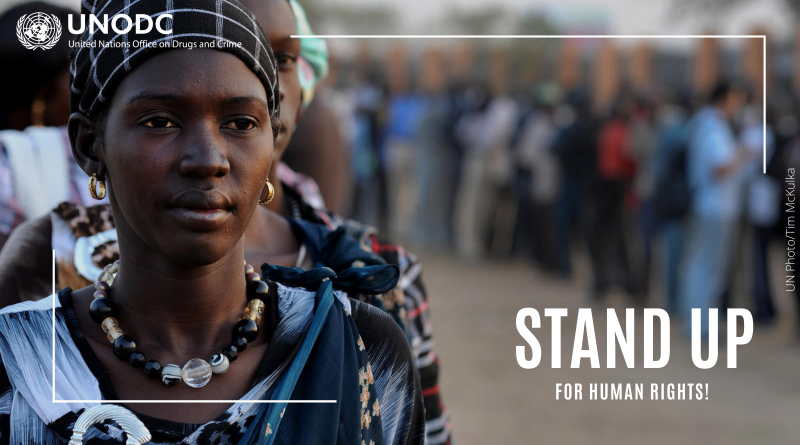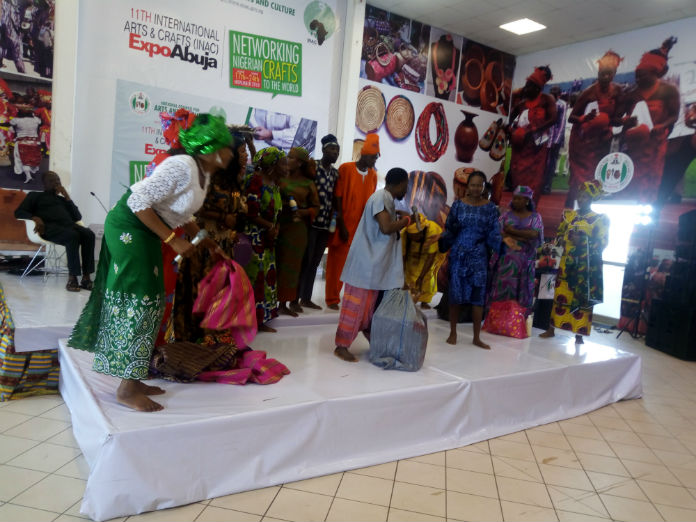UNODC, the Nigerian Government and the European Union partner in supporting female criminal justice professionals in the fight against Sexual and Gender Based Violence by Terrorist groups.
Hauwa was 18 years old when she was arrested with a suicide vest. She has been held without charge in military detention for close to 5 years. When questioned for the motive behind her conduct, she responded that: ‘I decided to take up the mission of being a suicide bomber so that I can leave the Boko Haram enclave’. Whilst she had no intention of detonating the bomb, she claimed to use the mission as a decoy to escape Boko Haram leaving behind her r 5-year old son, who was a product of a forced marriage with a Boko Haram member. She knows that many people suspect she is a Boko Haram collaborator. But she argues that she and other girls like her should be praised for defying the militants.
This account sums up the fate of hundreds of women and girls who, either willfully or forcefully became associated with the deadly Boko Haram terrorist group that continue to wage terror in North East Nigeria. Like many terrorist groups, Boko Haram is known to have systematically targeted women and girls and committed horrific acts of sexual and gender-based violence against them as a tactic of terrorism.
While addressing issues of sexual and gender-based violence has been a priority for the Nigerian government, apart from the convictions of two low-level associates who participated in the abduction of the Chibok school girls in 2014 under charges of hostage-taking under the Terrorism Prevention Amendment Act 2013, no single conviction has been secured for the widespread acts of rape, forced marriages and sexual violence committed by the terrorist groups operating in North East Nigeria and the neighboring countries.
This is a growing concern for national stakeholders as well as the international community who are working to jointly address this issue.
The Nigerian Minister of Justice and Attorney General of the Federation, Mr. Abubakar Malami, joined a Special Event of the 14th UN Crime Congress today with UNODC’s Executive Director which was focused on the issue of women affected by terrorism. At the event, he reiterated that the Government of Nigeria shares many of these concerns, highlighting that “The Nigerian National Action Plan for Preventing and Countering Violent Extremism notes the important role women can play as policy-makers, law enforcement officers, but also wives and mothers in preventing violent extremism and in the rehabilitation and reintegration of violent extremist offenders”.
To commemorate this years’ International Women’s Day, with the theme, “Women in leadership: Achieving an equal future in a COVID-19 world”, UNODC puts the spotlight on the important work of female criminal justice actors and gender champions who are leading the way in prioritizing the prosecution of sexual and gender-based violence cases committed in the context of terrorism as well as promoting the rights of women such as Hauwa who are being deprived of their liberty.
Through its partnership with the Nigerian government and European Union UNODC provides specialized training and technical assistance on gender dimensions of criminal justice responses to terrorism to criminal justice actors and in particular, emphasizes the selection of women in training activities, directly impacting on recognition of gender dimensions in hundreds of terrorism cases currently being reviewed for prosecution.
An example of this impact is seen in the work of the specialized Complex Casework Group (CCG) of the Federal Ministry of Justice, which is responsible for prosecuting and bringing suspected terrorists to justice, led by UNODC- trained Prosecutor, Ms. Chioma Onuegbu. Onuegbu is working to include sexual violence related charges against Boko Haram suspects where relevant.
She has actively partnered with military, police, and security service investigators from the multiagency Joint Investigation Centre (JIC), in Northeast Nigeria, to advise them on good practices and approaches for successfully investigating these crimes which are usually complex to prove in court.
Thanks to her persistence further investigation are being conducted on all case files that relate to women who stated that they were married or forcefully married while in the Boko Haram enclaves.
The scope of UNODC’s advocacy in the context of supporting the role of women in the criminal justice sector also extends beyond capacity building initiatives into policy making.
Through regular engagements with the Administration of Criminal Justice Monitoring Committee (ACJMC), UNODC has been able to advocate for the inclusion provisions criminalizing the conduct of SGBV in the Terrorism Prevention and Prohibition Bill 2017.
(UNODC Media)




